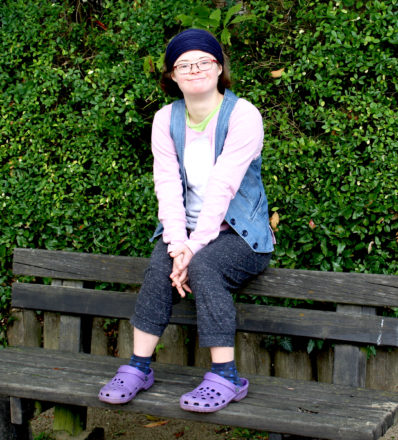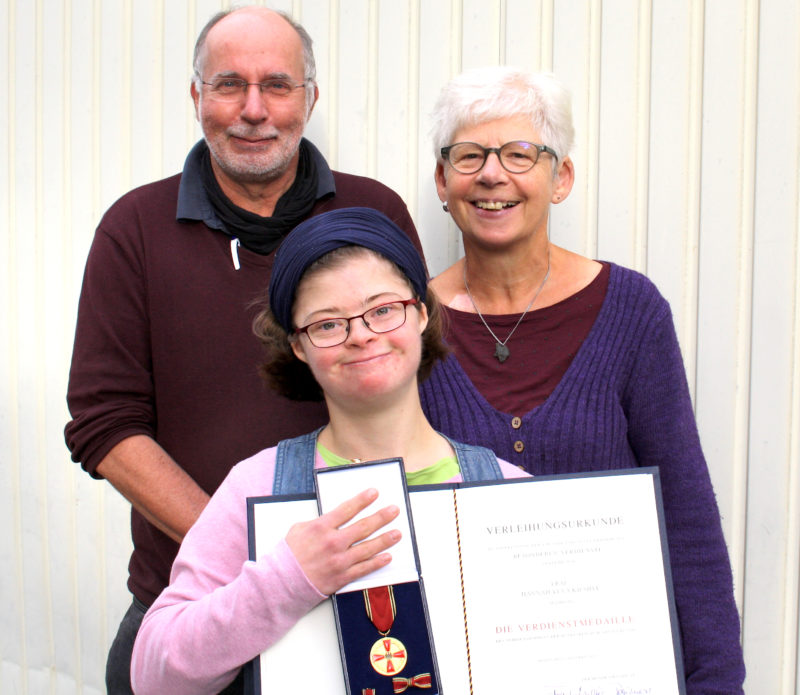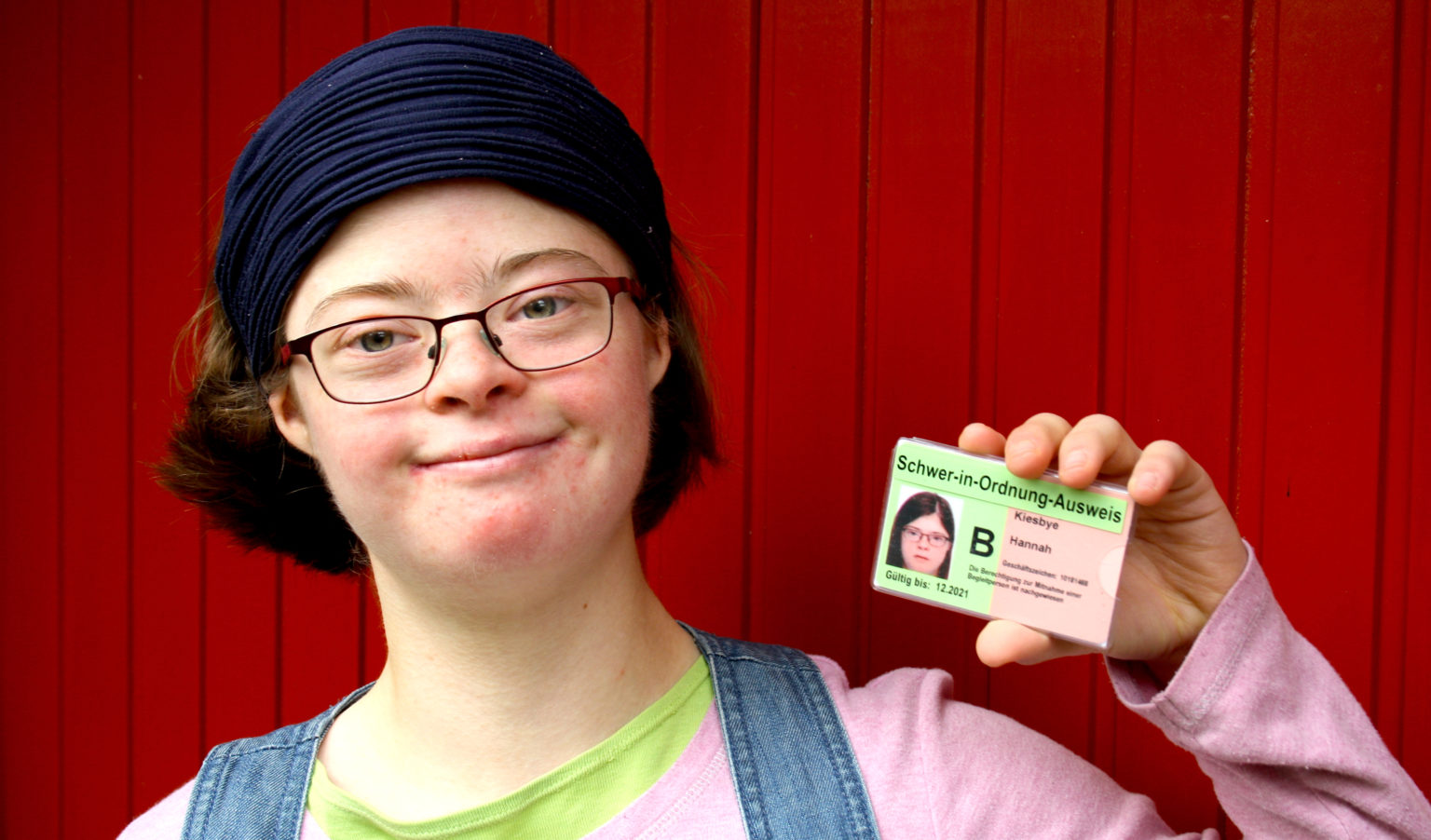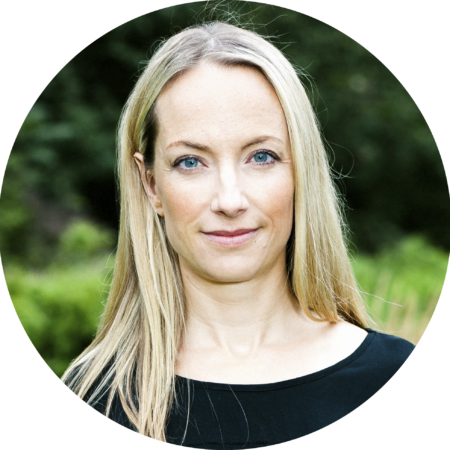Hannah Kiesbye was born with trisomy 21 – but the genetic mutation has not stopped the 18-year-old schoolgirl from anything in her life. On the contrary: she recently received the Federal Order of Merit for an idea that has triggered a nationwide discussion about the concept of disability.
By Anne Klesse, Hamburg

Federal President Frank-Walter Steinmeier and his wife Elke Büdenbender had probably never experienced anything like it before. At the award ceremony for the Day of German Unity on 3 October in Berlin, there was another spontaneous item on the programme that was not included in the protocol. As pianist Igor Levit played Bach’s “Aria” on the grand piano, one of the award winners surprised the guests with a poi juggling performance: Hannah Kiesbye confidently walked to the front and let her pink-coloured scarves circle on ribbons to the music.
The 18-year-old was an exception among the award winners anyway. This year, Steinmeier honoured 15 citizens with the Order of Merit of the Federal Republic of Germany – including Hannah Kiesbye from Halstenbek near Hamburg, who received the so-called “Medal of Merit” instead of a Federal Cross of Merit due to her young age. The honour is awarded for political, economic-social and intellectual achievements as well as for all special services, for example in the social and charitable sector.

It is the only general award of merit in Germany and therefore the highest recognition for services to the common good. When asked, the Office of the Federal President said: “Hannah Kiesbye is not the first minor to be honoured with the Order of Merit, but she belongs to the very small circle of those who have been awarded the Order at such a young age.”
The motto of this year’s award ceremony, “United and there for each other”, was intended to symbolise the extraordinary achievements of the seven women and eight men who were honoured: “They are helping to overcome the coronavirus pandemic, promoting the growing together of East and West and helping to break down prejudices in our society.”
The latter also refers to Hannah Kiesbye. The young woman, who was born with trisomy 21, had an idea that caused quite a stir and is still a topic of discussion in social organisations and politics today: she invented the “Schwer in Ordnung“, or “In Perfect Order ID card”. The idea was born in 2017, when Hannah Kiesbye was asked for her severely disabled ID card at the ticket desk at the swimming pool.
Hannah does not feel “severely disabled“
“At that moment, I realised what it actually said,” she recalls. “I thought: I’m not severely disabled. I’m just fine the way I am.” The ID card, which she also has to show for discounted admission on buses and trains or in museums, and her self-perception as a self-determined teenager simply didn’t fit together for the then 14-year-old.
The term disability is defined in the 9th German Social Code as, among other things, the fact that a person is restricted in their participation in life. But Hannah does not feel restricted. She goes to school, sings and plays the piano, socialises with friends, is an aunt to her older sister’s two children, enjoys listening to music from the band “Deine Freunde” and has fun at the weekly circus school, where she does pois juggling, among other things. “I actually do everything that others my age do,” she says. Her friends and classmates, whether in a wheelchair or with spasticity: “Everyone is who they are. Everyone is great. You know, in perfect order.”
After a visit to the swimming pool, she told a teacher about her thoughts. She then made herself a new ID card at school: with the help of a universal marker, she created the official-looking lettering “Schwer-in-Ordnung-Ausweis” („In Perfect order card“). Hannah Kiesbyes stuck this onto the protective cover in such a way that it covered the official wording “severely disabled person’s ID card”. A feeling had turned into a real object. In her school’s writing workshop, Hannah wrote a text about it for the school newspaper.
The article later appeared again in the publication of the association KIDS Hamburg e.V., the competence and information centre for Down syndrome, in which she and her parents are involved. And the article was shared thousands of times on social media. In it, she wrote: “I imagine: I’ve bought a ‚In Perfect Order card‘ and now I’m standing at the bus stop in Pinneberg and I’m happy. The bus arrives, I get on and proudly show my new ID. I’m travelling back home from Pinneberg.” And then: “When I get home, my mum and dad are amazed when I suddenly stand in front of them with my new card.”
Language can break down walls, says the Federal President
Hannah Kiesbye was on holiday in Denmark with her parents. Her older sister phoned and told her about the enormous amount of attention surrounding the “In Perfect Order card”. A short time later, Hamburg’s Senator for Social Affairs, Melanie Leonhard (SPD), promised in an interview that everyone who applies to the responsible pension office in the Hanseatic city would receive such an ID card from the authority: “This campaign and its public resonance shows me that there is a need to discuss this concept among those affected.”

This gave Hannah Kiesbye’s idea nationwide attention and political relevance. “I was invited to breakfast with the senator. She asked me how I made this cover and how I came up with it.” Hannah felt that she was taken very seriously. Being taken seriously and being seen for who she is – as a completely normal young woman – is what the pupil is all about.
Her parents and two older siblings refer to her as having “special needs” rather than “disabilities”. Hannah Kiesbye changed schools in summer 2019 and is now in year 13 at Campus Uhlenhorst, a Hamburg educational institution for young people with various special needs. Over the next three years, she wants to try out internships before deciding on a career – in a retirement home, catering, acting or singing. The young woman has many interests and talents.
After the award ceremony, for which Hannah Kiesbye bought her first blazer especially, there was a reception with canapés and drinks. The Federal President and his wife went to each of the bar tables, which were widely distributed due to the coronavirus distancing rules, and exchanged a few words with the award winners and their companions. “They said that they were happy that I was there and that they liked my performance,” Hannah Kiesbye recalls. “And they wanted to know where I learnt to juggle with the pois.”
“Language can break down walls,” said Federal President Steinmeier at the award ceremony. Hannah Kiesbye’s initiative had made people sit up and take notice and “has triggered a nationwide discussion that is not just about a new name for an ID card, but about changing the way we look at people with disabilities.” In line with the principle of the UN Convention on the Rights of Persons with Disabilities “Not about us without us”, she represents their interests. The debate she triggered has changed the view of people with disabilities and shown how important it is that we pay attention to our language.
The Kiesbyes don’t know who nominated them for the Order of Merit. Back at home, a whole pile of congratulatory messages was waiting for her. The neighbours came by, applauded and presented her with a card they had made themselves. “You should be very proud of yourself and we are too. You’re great,” it says. Hannah Kiesbye is still happy about it today. And her parents are also touched by the compassion shown to her.
Now, when she goes to the swimming pool or gets on the bus, the 18-year-old proudly shows her „In Perfect Order card”. She no longer uses the original from 2017. She has a choice of several plastic sleeves that have been sent to her by various federal states. This is because the new kind of card is now available almost everywhere. When asked, the social welfare authority was unable to say how many have been issued in Hamburg alone to date. Kiesbye’s impression is that the inspectors are not particularly interested in what exactly is written on it. But it makes a big difference to the people who ask for it.











